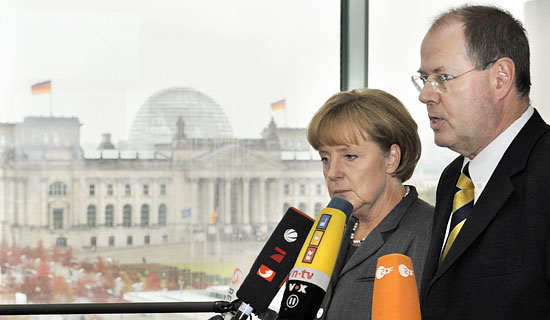
Chancellor Angela Merkel and Finance Minister Peer Steinbrück announcing their plan for Hypo Real Estate in Berlin on Sunday. (Pool photo by Rainer Jensen)
FRANKFURT: As German leaders and bankers worked feverishly to rescue a lender considered too big to fail, the government announced Sunday that it would guarantee all private savings accounts in Germany – worth about €500 billion – in an effort to reinforce increasingly shaky confidence in the financial system.
Officials in Berlin were frantically trying to salvage a €35 billion, or $48 billion, bailout devised just a week ago for Hypo Real Estate, a major German property lender based in Munich and member of the benchmark stock index, after commercial banks withdrew their support, fearing greater losses.
The Belgian authorities, meanwhile, were looking for ways to secure the future of Fortis operations in Belgium, after its Dutch operations had been nationalized by the Netherlands on Friday.
In Iceland, where the government seized control of a bank last week, officials were considering more sweeping measures to stabilize finances there as well.
And the board of UniCredit, which is based in Milan and also operates in Germany and much of Eastern Europe, met to consider a capital increase after being buffeted by a week of speculation about its solvency. A nightmare outcome for Europe would be the failure of a major, border-straddling bank like Unicredit.
Much of the weekend activity was undertaken with a view toward having solutions in place by the time financial markets opened Monday in Asia, a trigger point that officials around the world have come to view warily.
With memories of how the bankruptcy of Lehman Brothers put the crisis into high gear three weeks ago, officials fear letting investors wake up to a festering problem. That could easily provoke new losses in stock markets and test the limits of tight credit markets, the core of the crisis.
Worried that the continued turmoil at Hypo Real Estate would lead to a depositors’ panic at other German banks, Chancellor Angela Merkel and Finance Minister Peer Steinbrück made a rare Sunday appearance before television cameras in Berlin on the steps of the Chancellery to assure a jittery public about the safety of their savings.
The government first promised the deposit guarantee obliquely and later added a more explicit promise, with plans to seek any necessary legislation to carry it out.
“This is an important signal,” Steinbrück said, “so that it comes to some calming down, not to reactions that would be out of proportion and would make our crisis management and crisis prevention that much more difficult.”
Mindful of the rising public anger at the use of public money to buttress the business of high-earning bankers, Merkel promised a day of reckoning for them as well.
“We are also saying that those who engaged in irresponsible behavior will be held responsible,” Merkel said. “The government will ensure that. We owe it to taxpayers.”
German deposits are already guaranteed through a mixture of deposit insurance plans, with the first line of defense being a state fund.
A second line is the programs to which Germany’s public, private and community banks contribute. The Finance Ministry said the new blanket guarantee would be effective immediately, although it was unclear whether new legislation would be needed.
“We think this will create the confidence we need,” said a ministry spokesman, Stefan Olbermann. “That means the cost could be nothing.”
Reports about the banking crisis had created “great uncertainty” among ordinary Germans, prompting the guarantee, Olbermann said. Over the past week, the German media have engaged in an angst-ridden discussion about the safety of private savings.
However radical, the German move stops short of what Ireland did with its banks last week. The Irish government backstopped savings accounts as well as other liabilities of six domestic banks, a step that effectively lent a sovereign guarantee to creditors of the banks and ensured their solvency.
Senior German officials meeting in the chancellor’s office Sunday morning were joined by Josef Ackermann, chief executive of Deutsche Bank, and Klaus-Peter Müller, chairman of the Association of German banks and Commerzbank, a large retail and corporate bank.
The Hypo Real Estate rescue plan, announced last Monday, quickly fell apart over the company’s liabilities, which are linked to the U.S. municipal bond market, according to a person briefed on the talks, who requested anonymity because the outcome was still unclear.
Talk in Berlin of winding the bank’s operations down as the price for the bailout had accelerated its problems – and further depressed its share price – over the past week, said a Hypo spokesman, Hans Obermaier.
Depfa Bank, a Dublin-based lender that was acquired by Hypo last year and specializes in government lending, is at the center of its problems. Depfa underwrote a package of U.S. municipal bonds that were subsequently downgraded by ratings agencies. That step obliged Depfa to buy the bonds back, a contractual requirement that would create almost immediate liquidity problems at Hypo itself, given the difficulty of getting short-term funding in today’s credit markets.
By Carter Dougherty
Published: October 5, 2008
Source: International Herald Tribune